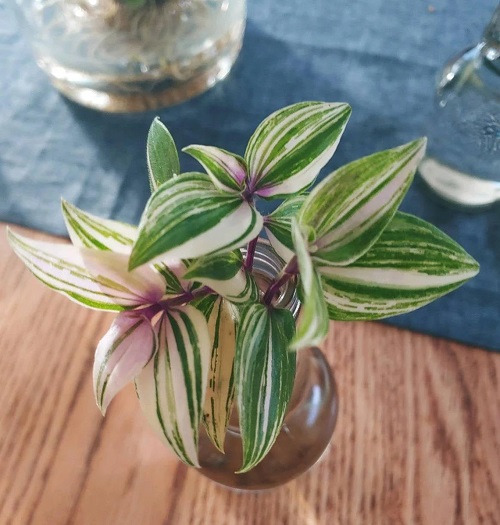Wandering Dude is one of the easiest houseplants to propagate. We handpick some of the best varieties you can grow from cuttings!
Known by several names like the inch plant, spiderwort, and zebra plant, the Wandering Jew has always been a wildly popular houseplant. One of the easiest specimens to propagate, we share a list of our favorite tradescantia varieties you can quickly grow from cuttings.
How to Grow Wandering Jew from Cuttings?
Comprising over 70 varieties, the Wandering Jew can quickly take over vast spaces as ground cover or creepers in nature. This rapid-growing habit makes it perfect for growing, spreading, and sharing from cuttings! Here’s what you do.
When pruning your plant, collect healthy stem cuttings from the mother plant. Remove most leaves, but save a few on top intact. Fill a small pot with a moist potting soil mix, plant these cuttings, and place them in a spot with filtered sunshine.
Remember to cut below a node—the point where the leaves meet the stem. You can also propagate them in water; ensure the bottom of the stem and leaf node where roots will develop are fully submerged.
In about a month or two, baby shoots will start sprouting from these containers, indicating that the plant’s roots are quickly developing. In water, when the roots grow to about 1-2 inches long, you can transplant them to a tiny container.
Best Wandering Jew Varieties to Grow from Cuttings
1. Silver Inch Plant

Botanical Name: Tradescantia zebrina
USDA zones: 9-11
Native to Mexico and Guatemala, this popular houseplant forms dense mats and grows rapidly in regions with mild to warm winters. This classic tradescantia sports silver, green, and purple stripes on the upper surface and a deep magenta on the lower side of its leaves.
It trails well from hanging planters and containers and also works as an underplant for bigger specimens. Allow the soil to dry out between waterings and give it ample indirect sunlight indoors.
2. Small-Leaf Spiderwort
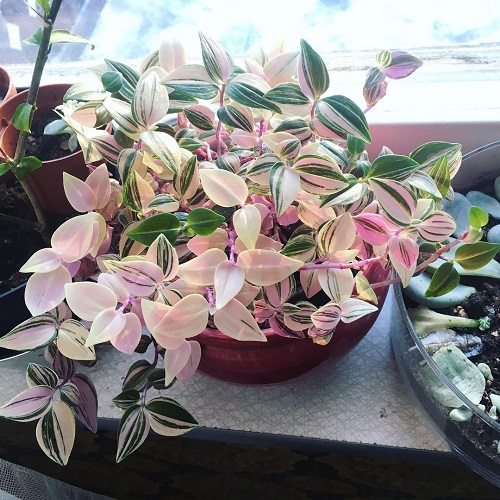
Botanical Name: Tradescantia fluminensis
USDA zones: 9-12
This Wandering Dude variety is native to South America and grows quickly from cuttings. With fleshy, ovate leaves showcasing white and deep green variegation and slender, delicate stems, small-leaf spiderworts look amazing in terrariums and hanging baskets.
While it lacks the variegation and stripes of the zebrina variety, it is a vigorous grower and quite colorful. When cut, its stem secretes a silky, sticky, spider web-like substance, which gives its “spiderwort” nomenclature.
3. Purple Heart
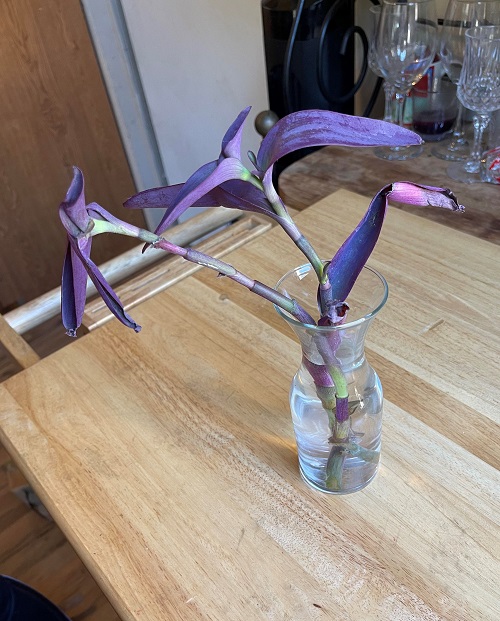
Botanical Name: Tradescantia pallida
USDA zones: 7-11
Also known as purple queen, this tradescantia variety has deep purple foliage and lilac blooms, and looks beautiful both as a ground cover or as a hanging plant. Its hues deepen and become more intense when it gets ample sunshine.
With lance-shaped long leaves on fragile stems, this low-grower is used for mass ground plantings. It offers a great contrast to chartreuse-foliaged and bright-blossomed companions on garden beds. Also, here’s how to bring out the best colors on your tradescantias.
4. Boat Lily
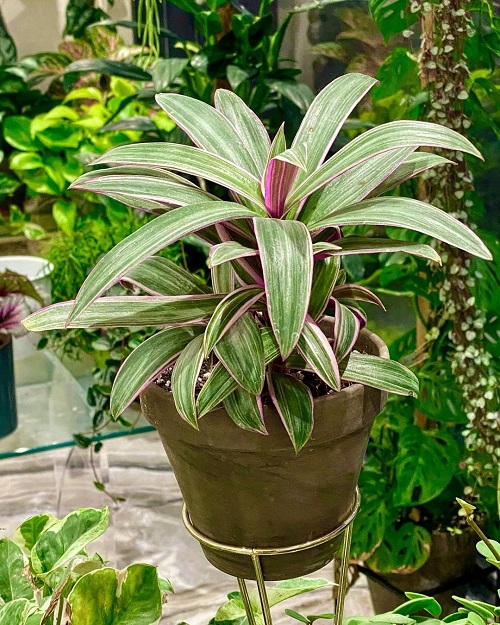
Botanical Name: Tradescantia spathacea
USDA zones: 9-11
Also known as Moses-in-the-cradle, this variety has long, wide, bright green leaves with purplish-red undersides that grow upright in clumping rosette-like arrangements. Quite the invader, grow boat lily in containers to keep it from colonizing other vegetation.
It also becomes easier to move it indoors during the threat of frost. Remember to cut back on water during winter.
5. Bubblegum Lilac
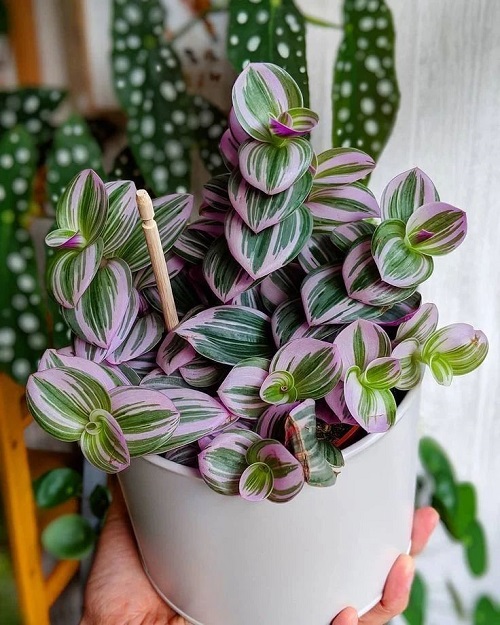
Botanical Name: Tradescantia blossfeldiana
USDA zones: 9-11
Bubblegum Lilac is a tricolor variety showcasing variegated foliage in delicious shades of bubblegum pink, cream, and green. A voracious grower with trailing stems, you will find that it develops rapidly once propagated from cuttings.
Simply plant it in pots or hanging baskets or prepare to train it on walls and shelves, and you’ll be rewarded with breathtaking foliage in no time! Check out this article on how to train your tradescantias.
6. Giant White Inch Plant
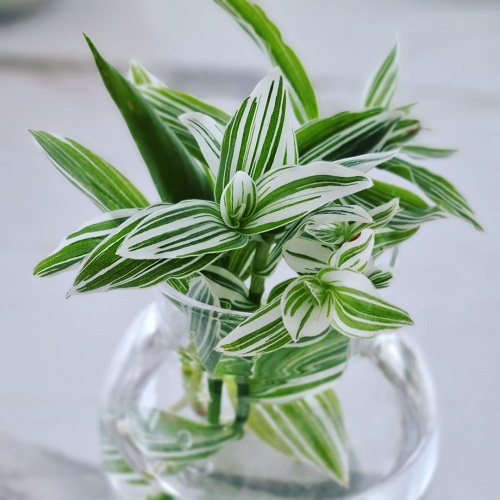
Botanical Name: Tradescantia albiflora ‘Albovittata’
USDA zones: 9-12
This medium-sized Wandering Dude variety looks quite unique and different from the rest, but also grows rapidly from cuttings. It showcases large foliage with green edges and white watercolor brush strokes on the surface, and purple undersides.
You can leave it to trail, cascade, or trim it to form a compact, round bush, but the best bit about this hardy variety is how easily it tolerates different growing conditions.
7. Tradescantia Lisa
Botanical Name: Tradescantia mundula Lisa
USDA zones: 10-12
Looking for the perfect fast-growing plant for the hanging basket on your patio? Propagate this tricolor variety, which showcases foliage of green, white, and pastel pink. The leaves are small, oval, pointed, and variegated, and the hues intensify in brighter light.
Native to Brazil and Argentina, it grows well in wall planters, window boxes, and mixed containers in part to full shade. You can also grow it in water like other varieties!
8. White Velvet
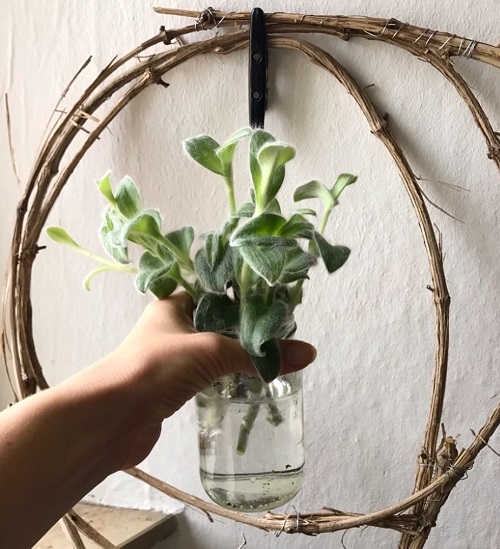
Botanical Name: Tradescantia sillamontana
USDA zones: 10-11
Our final Wandering Dude variety, which grows well from cuttings, is also known as cobweb spiderwort. While its oppositely placed lance-shaped leaves are a lush green, the stems are coated with tiny white, silvery hairs, giving the plant a velvety texture and a silver sheen.
With perfectly symmetrical foliage, cutting back the plant after flowering will prompt a second round of blooms and prevent it from reseeding and spreading too much!
Hope you enjoyed our selection of the best Wandering Jew varieties you can easily grow from cuttings. Be sure to research the care requirements for each type, and share the varieties you chose for your home via the comments below!


